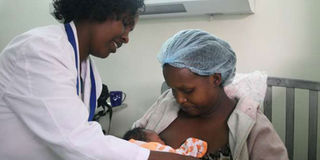Unicef warns against delay in giving breast milk to newborn baby

Mercy Kawira is shown how to breastfeed a baby by a nutritionist at Kenyatta National Hospital on July 31, 2013. Dr Bégin said if all babies are fed nothing but breast milk from the moment they are born until they are six months old, over 800,000 lives would be saved globally every year. PHOTO | PHOEBE OKALL | NATION MEDIA GROUP
What you need to know:
- Progress in getting more newborns breastfed within the first hour of life has been slow over the past 15 years.
- As the world celebrates Breastfeeding Week 2016 from today to August 7, Director of Medical Services Nicholas Muraguri says there is need for parents to observe exclusive breastfeeding.
One in every two children born is not breastfed within an hour of delivery, depriving the baby of essential nutrients, says United Nations Children's Emergency Fund (Unicef).
“Making babies wait for too long for the first critical contact with their mother outside the womb decreases the newborn’s chances of survival,” said Unicef senior nutrition adviser France Bégin.
Dr Bégin said if all babies are fed nothing but breast milk from the moment they are born until they are six months old, over 800,000 lives would be saved globally every year.
Progress in getting more newborns breastfed within the first hour of life has been slow over the past 15 years, according to Unicef data.
In sub-Saharan Africa, for example, where under five mortality rates are the highest worldwide, early breastfeeding rates increased by just 10 per cent since 2000 in East and Southern Africa.
The longer breastfeeding is delayed, the higher the risk of death in the first month of life.
Delaying breastfeeding by 2 to 23 hours after birth increases the risk of dying in the first 28 days of life by 40 per cent.
Delaying it by 24 hours or more increases that risk to 80 per cent.
As the world celebrates Breastfeeding Week 2016 from today to August 7, Director of Medical Services Nicholas Muraguri says there is need for parents to observe exclusive breastfeeding.
“Breast milk is a baby’s first vaccine. It contains all the nutrients children need in the first six months of life. It is the first and best protection they have against illness and disease,” said Dr Muraguri.
MAKING THE DIFFERENCE
He said with newborns accounting for nearly half of all deaths of children under the age of five, early breastfeeding can make the difference between life and death.
“Mothers should breastfeed for at least six months, which ensures that a child growing up in the developing world is 15 times less likely to die from killer diseases such as pneumonia and diarrhoea,” he said.
This year’s theme is how breastfeeding is a key element in getting us to think about valuing our well-being from the beginning of life, and how to respect each other and care for the world we share.
In Kenya, child survival has improved significantly, with the death of babies under the age of five declining to 52 for every 1,000 births last year, from 74 in 2008-2009, a survey revealed.
This means one in every 19 children born in the past year died before their fifth birthday.
The six-month survey found that 61 per cent of children less than six months of age are exclusively breastfed, an increase from 32 per cent in the 2008-2009 period.
However, the 2014 Kenya Demographic and Health Survey found that 15 per cent of children under six months of age are given food, water, other milk and non-milk liquids.
Unicef analyses show that women are not getting the help they need to start breastfeeding immediately after birth, even when a doctor, nurse of midwife is assisting their delivery.





